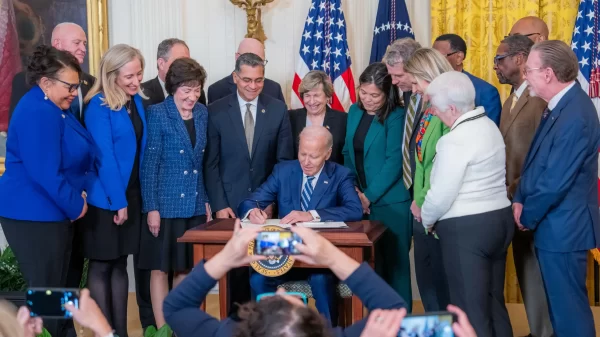By Brandon Moseley
Alabama Political Reporter
Federal Government Mediators are asking for one last meeting between The International Longshoremen’s Association (ILA) and United States Maritime Alliance, Ltd. If an agreement is not reached in the next few days then as many as 14,650 longshoremen could walk off their jobs as soon as Sunday.
Mobile is one of the ports that would be affected by the possible strike or lockout. The ILA has not had a strike of East Coast ports since 1977.
If a strike or a lockout happens the container ports affected would include: Boston, New York/New Jersey, Delaware River, Baltimore, Hampton Roads, Wilmington, Charleston, Savannah, Jacksonville, Port Everglades, Miami, Tampa, Mobile, New Orleans, and Houston. All would immediately cease most operations.
Port authorities along the both the Gulf Coast and the East Coast are bracing for the worst.
The executive director of the Georgia Ports Authority Curtis Foltz told the Wall Street Journal, “It looks pretty likely at this point.” Foltz said that Georgia’s ports would lose as much as 80% of their traffic if the strike goes ahead. “Everyone in the industry is very disappointed to be at the point where we are today.” he said.
The United States Maritime Alliance Ltd. represents ocean carriers, marine terminal operators and port associations.
The National Retail Federation has sent a letter to President Barack H. Obama asking the President to utilize a provision in the 1947 Taft-Hartley Act to keep the two sides at the negotiating table and head off a coast-wide strike for 80 days.
President Shay said in his letter to the President, “A strike of any kind at ports along the East and Gulf Coast could prove devastating for the U.S. economy. We call upon you to use all means necessary, including Taft-Hartley, to keep the two sides at the negotiating table and head off a coast-wide strike.” . “We call upon you to use all means necessary, including Taft-Hartley, to keep the two sides at the negotiating table and head off a coast-wide strike.” “We cannot afford further supply chain disruptions as we enter 2013. The two sides must remain at the negotiating table until a deal is reached.”
The two sides agreed to a 90-day contract extension, which expires Dec. 29 at midnight.
The sticking point in the negotiations is a proposal to cap “container royalty” payments that companies make to a union fund that supplements worker salaries and funds worker health care.
Prior to the 1950s, the longshoremen unloaded dockside trucks, warehouses, and rail cars and loaded the freighters of that time (often by hand) and vice versa. In the 1960s, technology changed allowing ships to be loaded with cargo containers. Instead of dozens of burly guys carrying bundles of merchandise from the dock to the ship on their backs, a half dozen guys and massive gantry cranes load and unload much bigger ships in much less time. In exchange for “allowing” the ports to embrace the new technology of the 1960s the container carriers agreed to make the payments based on an assessment of the container tonnage handled at each port in a year. Originally intended to help subsidize the downsizing of the dock worker work force due to the then new technology, the payments are now considered a supplemental wage by the dockworkers. As tonnage of container cargo increased, the container royalty increased. The alliance now wants to cap payments to 2011 levels and limit who can receive them in the future. The union wants to sees the container royalty payments continue growing into the future without any restrictions.
The strike would not apply to military cargo and to goods not shipped in containers.
According to the National Retail Federation (the world’s largest retail trade association) if the Port of Mobile and the other ports shut down it would negatively impact every importer and exporter that utilizes the container port, from manufacturers and truck drivers to farmers and retailers. Potentially hundreds if not thousands of U.S. jobs would be lost and the U.S. economy would lose millions of dollars a day.
Goods that we buy in our stores that are manufactured or grown overseas we could no longer buy because there would potentially be no longshoremen to unload the ships that come to port. American farms and factories that sell goods overseas would lose their foreign markets without longshoremen to load the ships. American manufacturing plants (like Mercedes, Honda, Hyundai, and Toyota) who need parts and components that come through the parts would potentially have to shut down if their supply chains are interrupted by the closing of the ports.





















































